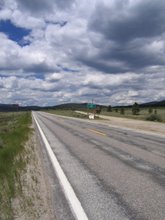A Reflection for an Evening Service
I’ve always had trouble being still. In college, I remember sitting at concerts or plays, my mind racing over what I was supposed to be doing the next day, worried that I had missed something that had already needed doing, oblivious to the music around me. Doing, I was always doing! With little rest and even less stillness. If I couldn’t stop for entertainment, it was even harder to be still for prayer. Partially it was temperament, but partially it was just doing too many things; learning to let go, to put down tasks was necessary for my spiritual growth.
Yet there have always been rare moments of exceptional peace or beauty that have jarred me out of my endless running loop—I remember this early morning in Western Massachusetts, misty and early fall, with low clouds moving over the green mountains. I stood there, on the sidewalk, still, so still, watching and being and listening. I remember that time even today, and return to that memory of stillness when begin to get overwhelmed.
It is easy for complaints about busyness to morph into a subtle bragging—“I’m busier than you, look at all the stuff I do”. Busyness often serves as a status symbol, a symbol of achievement or importance. Against this stands the virtue of stillness and inner peace, which questions the need to do more.
I’ve learned a lot from reading Henry David Thoreau, a 19th century transcendentalist, and self-described “inspector of snowstorms.” He was a critic of doing for doing’s sake, and spent two years writing Walden and living simply in “the wilderness”, a “wilderness” not too far from the center of Concord, MA.
I don’t advocate leaving society entirely behind, and while it is tempting to talk of simplicity, few have succeeded at living so. Instead, what I’ve taken from Thoreau’s work is that there is a great deal to be learned from the practice of stillness, and that such stillness cannot be achieved unless we spend some time idle. Thoreau’s idleness was a gift, says the monk Thomas Merton, that we still have not learned to appreciate. Much, I think, like the gift of the Sabbath.
Thoreau wrote:
I went to the woods because I wished to live deliberately
… and not, when I came to die, discover that I had not lived. I did not wish to live what was not life… nor did I wish to practice resignation, unless it was quite necessary. I wanted to live deep and suck out all the marrow of life.
This, I think is what stillness offers, what the sacred text for today [
Edward Carpenter's "Lake of Beauty"] also pointed us towards: being still prevents us from dissipating, from “recklessly spilling the waters of our minds in this direction and that”. In the midst of the crush of small decisions, taking time for stillness invites us to withdraw, and to stop frittering our lives away by detail; to listen for the voice of God and to center our lives before returning to the work, pleasure, and company that await us in the world.
Sacred Text:“The Lake of Beauty”, by Edward Carpenter (a 19th century English poet and minister). This poem is included in the New Zealand Book of Common Prayer, and originally published in
Towards Democracy.Let your mind be quiet, realising the beauty of the world, and
the immense, the boundless treasures that it holds in store.
All that you have within you, all that your heart desires, all
that your Nature so specially fits you for - that or the counterpart
of it waits embedded in the great Whole, for you. It will surely
come to you.
Yet equally surely not one moment before its appointed time
will it come. All your crying and fever and reaching out of hands
will make no difference.
Therefore do not begin that game at all.
Do not recklessly spin the waters of your mind in this direction
and in that, lest you become like a spring lost and dissipated
in the desert.
But draw them together into a little compass, and hold them
still, so still;
And let them become clear, so clear - so limpid, so mirror-like;
At last the mountains and the sky shall glass themselves in
peaceful beauty,
And the antelope shall descend to drink, and to gaze at his
reflected image, and the lion to quench his thirst,
And Love himself shall come and bend over, and catch his own
likeness in you.

